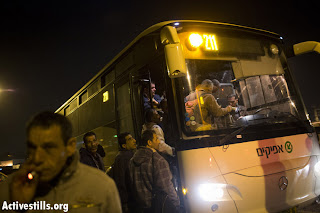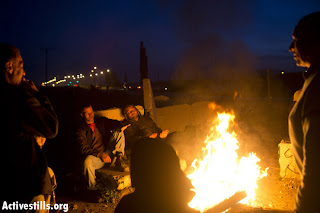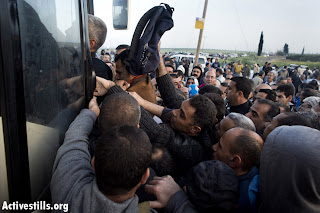Israel introduces 'Palestinian only' bus lines, following complaints from Jewish settlers
Afikim bus company to have special buses for Palestinian workers commuting from the West Bank to jobs in central Israel; announcement follows complaints from settlers that Palestinians are a security risk.
 |
| Palestinian protesters on an Israeli bus line in the West Bank last year. |
The Afikim bus company will begin operating Palestinian-only bus lines from the checkpoints to Gush Dan to prevent Palestinians from boarding buses with Jewish passengers. Palestinians are not allowed to enter settlements, and instead board buses from several bus stops on the Trans-Samaria highway.
Last November, Haaretz reported that the Transportation Ministry was looking into such a plan due to pressure from the late mayor of Ariel, Ron Nahman, and the head of the Karnei Shomron Local Council. They said residents had complained that Palestinians on their buses were a security risk.
The buses will begin operating Monday morning at the Eyal crossing to take the Palestinians to work in Israel. Transportation Ministry officials are not officially calling them segregated buses, but rather bus lines intended to relieve the distress of the Palestinian workers. Ynet has reported that fliers are being distributed to Palestinian workers notifying them of the coming changes.
Any Palestinian who holds an entrance permit to the State of Israel is allowed by law to use public transportation. Officials at the Samaria and Judea District Police have said there is no change in the operation of the rest of the buses, nor is there any intention to remove Palestinians from other bus lines. But Haaretz has in the past reported incidents when Palestinians were taken off of buses, and witnesses at checkpoints say that such incidents are ongoing.
Ofra Yeshua-Lyth is a member of Machsom Watch, a female advocacy group monitoring West Bank checkpoints. She says that recently, Bus 286 from Tel Aviv to Samaria arrived at a checkpoint filled with Palestinian workers. She filed the following report:
"Police officer Advanced Staff Sergeant Major Shai Zecharia stops the bus at the bus stop. Soldiers order all the Palestinians off the bus. The first thing they do is collect all their identity cards as they get off. One by one, the Palestinians are told to go away from the bus stop and walk to the Azzun Atma checkpoint, which is about 2.5 kilometers away from the Shaar Shomron interchange. All of them responded with restraint and sadness, at most asking why. Here and there they received answers such as, ‘You’re not allowed on Highway 5’ and ‘You’re not allowed on public transportation.’ Advanced Staff Sergeant Major Zecharia gave some vital information to one of the older Palestinians who had arrived there, telling him: You should ride in special vans, not on Israeli buses.”
In response to the report, the Transportation Ministry said it "has not issued any instruction or prohibition that prevents Palestinian workers from riding the public bus lines in Israel or in Judea and Samaria. Furthermore, the Transportation Ministry is not authorized to prevent any passangers from riding those lines."
"The two new lines that will be run as of tomorrow (Monday) are intended to improve the services to Palestinian workers that enter Israel via the Eyal Crossing," the ministry's statement continued, adding that the new lines will replace the "pirate" driving services who have been transporting Palestinian workers "at exorbitant prices and in an irregular fashion."
According to the ministry, the new lines will depart from the Tzofim area near Qalqilyah and will transport workers to their places of work in the Sharon region and Tel Aviv, at "especially cheap prices." For example, the tariff for traveling to Kfar Sava or Raanana will be NIS 5.1, and to Tel Aviv will cost NIS 10.6. This is compared to some NIS 40 that passengers have been charged by the private transportation services for each direction, the ministry said.
"The new lines will lessen the burden that has formed on buses as a result of the increase in numbers of working permits provided to Palestinians, who are permitted to work in Israel and will contribute to the improvements of services, for the betterment of Israelis and Palestinians as one", the statement said.
The Samaria and Judea District Police have yet to respond to the report.
Photos: Israel's new 'Palestinian only' segregated bus lines
A new Israeli bus line will serve only Palestinians. Officials claim it’s not segregation, but the ongoing experience of discrimination faced by Palestinian workers speaks for itself. |
| Palestinian workers with Israeli work permits wait to board a new Israeli bus line for Palestinians only, after crossing the Eyal checkpoint. |
 |
| Palestinian workers with Israeli work permits attempt to board a new Israeli bus line for Palestinians only, after crossing the Eyal checkpoint near the West Bank city of Qalqilya, March 4, 2012. |
 |
| Palestinian workers with Israeli work permits wait to be picked up for work after they cross the Eyal checkpoint. |
While officially the new lines are considered “general bus lines,” Ynet learned Saturday that their existence has been made public only in Palestinian villages in the West Bank, via flyers in Arabic urging Palestinians to arrive at Eyal crossing and use the designated lines.
The Transportation Ministry defended the plan, saying it was the result of reports and complaints saying that the buses traveling in the area were overcrowded and rife with tensions between the Jewish and Arab passengers.
A ministry source said that many complaints expressed concern that the Palestinian passengers may pose a security risk, while other complaints said that the overcrowded buses cause the drivers to skip stations.
The ministry has also gotten reports of scuffles between Jews and Arab passengers, as well as between Palestinians and drivers who refused to allow them to board their bus.
 |
| Workers try to keep warm near a campfire while awaiting transportation in the early morning cold near Eyal checkpoint. |
Legally, however, there is no way to stop Palestinians from boarding “regular” lines: “We are not allowed to refuse service and we will not order anyone to get off the bus, but from what we were told, starting next week, there will be checks at the checkpoint, and Palestinians will be asked to board their own buses,” a driver with Afikim – the company that holds the routes franchise for the area – told Ynet.
And the racism underlying such measures is hardly concealed:
Another driver said that, “Driving a bus full of only Palestinians might turn out to be tricky. It could be unnerving and it might also create other problems. It could be a scary thing.”
 |
| Palestinian workers wait in line to board an Israeli bus line only for Palestinians, after crossing the Eyal checkpoint. |
Officials at the Samaria and Judea District Police have said there is no change in the operation of the rest of the buses, nor is there any intention to remove Palestinians from other bus lines. But Haaretz has in the past reported incidents when Palestinians were taken off of buses, and witnesses at checkpoints say that such incidents are ongoing.
Palestinian workers with Israeli work permits wait to board a new Israeli bus line for Palestinians only, after crossing the Eyal checkpoint.
Also reporting on routine harassment faced by Palestinian passengers on Israeli buses, Haggai Matar gets to the heart of the matter:
The official state bodies – ministry, police and army – all stick to the dry question of whether or not Palestinians are allowed on the bus in Tel Aviv. The answer here is indeed yes. But the people who have to live daily with the reality of occupation – Palestinians and the settlers (including the bus company, which has its headquarters in Ariel) – expose the deeper layers of Apartheid: the separate checkpoints for different people, the racial profiling security system, the permit regime, and the route of the bus which is planned only for Israelis.
While new buses may remove the latter layer from Matar’s list, the question asked by Mairav Zonszein while the Transportation Ministry was still considering this measure late last year stands: “[I]n order to solve the problem of overcrowding, why not simply add more bus lines for everyone? Why the need to specify who they are for?” And her conclusion is more relevant than ever:
While the Transportation Ministry, the police, the bus company heads and the settler council leaders have or will claim that this is not racist, that it does not constitute the formal institutionalization of ethnic segregation, it makes no difference, because that is exactly what it is. Clear as day. And considering it is no secret that most Israeli Jews prefer ethnic segregation, no one should be surprised. When military control and occupation is the norm, it is only “natural” that a de facto reality becomes a de jure one.
